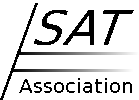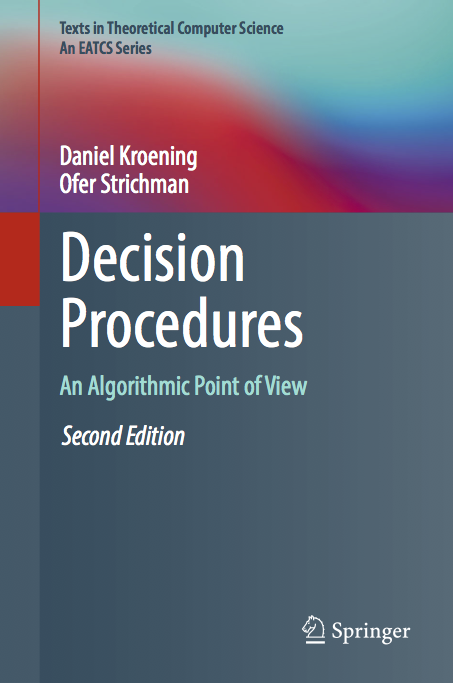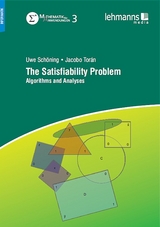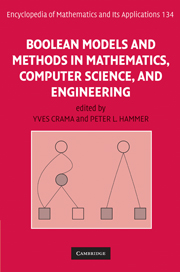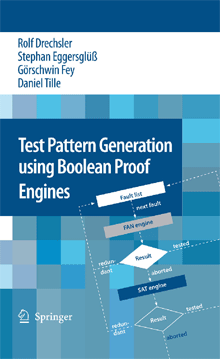SAT Live!
keep up to date with research on the satisfiability problem
Recent news about SAT subscribe via RSS
-
Dec 14, 2015 Postdoc positions in SAT solving at KTH Royal Institute of Technology by Jakob Nordström PostDoc Position Deadline
The Theory Group at KTH Royal Institute of Technology invites applications for postdoctoral positions in SAT solving.
-
Dec 7, 2015 Second CFP - SAT 2016 - July 5-8, 2016 Bordeaux, France by Daniel Le Berre CFP Deadline
Second Call For Papers. Now includes programme committee. -
Oct 9, 2015 First CFP - SAT 2016 - July 5-8, 2016 Bordeaux, France by Daniel Le Berre CFP
The 19th international conference on Theory and Applications of Satisfiability Testing is taking place for the first time in France, in Bordeaux. -
Oct 6, 2015 VCLA International Student Awards by Florian Lonsing Awards
The Vienna Center for Logic and Algorithms announces the 2015 edition of the VCLA International Student Awards and calls for the nomination of authors of outstanding scientific works in the field of Logic and Computer Science, in the following two categories:
-
Sep 26, 2015 AAAI-16 Workshop on Beyond NP by Adnan Darwiche CFP
The goal of this workshop is to help unify and promote research areas that advance the design of solvers that reach beyond NP. -
Aug 19, 2015 SAT 2015: Early Registration Ends Soon! Student Grants Available! by Sean Weaver Registration
SAT 2015: Early Registration Ends Soon! Student Grants Available! -
Aug 6, 2015 SAT'15 Call for participation by Sean Weaver CFP
SAT'15 registration now open! -
Jul 15, 2015 FoSSaCS 2016 by Valentin Montmirail modal-logic CFP
19th International Conference on Foundations of Software Science and Computation Structures (FoSSaCS), April 2016, Eindhoven, The Netherlands. -
Jul 13, 2015 Advances in Modal Logic 2016 by Valentin Montmirail modal-logic CFP
11th International Conference on Advances in Modal Logic, 2016, Budapest, Hungary. -
Jul 6, 2015 FMCAD Student Forum 2015 by Georg Weissenbacher CFP
The deadline of this year's FMCAD student forum has been extended - the new deadline is July 09, 2015. -
Jul 2, 2015 SAT & CSP Track at IEEE ICTAI 2015 by Jean-Marie Lagniez CFP
Due to many requests, a new submission deadline has been fixed. -
Jun 12, 2015 22nd RCRA workshop (RCRA 2015) by Marco Maratea CFP
This event follows the series of the RCRA (Knowledge Representation and Automated Reasoning) annual meetings, held since 1994. The success of the previous events shows that RCRA is becoming a major forum for exchanging ideas and proposing experimentation methodologies for algorithms in Artificial Intelligence. -
Jun 11, 2015 Fifth International Workshop on the Cross-Fertilization Between CSP and SAT by Yael Ben-Haim CFP
CSPSAT 2015: Call for Papers Fifth International Workshop on the Cross-Fertilization Between CSP and SAT In conjunction with CP 2015 Cork, Ireland August 31, 2015 -
Jun 2, 2015 SAT & CSP Track at IEEE ICTAI 2015 by Jean-Marie Lagniez CFP
Following the success of the first and second editions of the SAT and CSP technologies special track at ICTAI 2013 and ICTAI 2014, this year again the IEEE-ICTAI conference will highlight a track dedicated to SAT and CSP. -
Jun 1, 2015 Weakening Cardinality Constraints Creates Harder Satisfiability Benchmarks by Ivor Spence Benchmarks
For some time, the satisfiability formulae that have been the most difficult to solve for their size have been crafted to be unsatisfiable by the use of cardinality constraints. Recent solvers have introduced explicit checking of such constraints, rendering previously difficult formulae trivial to solve. A family of unsatisfiable formulae is described that is derived from the sgen4 family but cannot be solved using cardinality constraints detection and reasoning alone. These formulae were found to be the most difficult during the SAT2014 competition by a significant margin and include the shortest unsolved benchmark in the competition, sgen6- 1200-5-1.cnf.
-
May 25, 2015 MAXSAT 2015 Evaluation by Jordi Planes Competition CFP
Submission for the MAXSAT competition is now open. The deadline for submitting solvers and benchmarks is June 30.
-
May 20, 2015 ACAI’15 Summer School on Constraints Solving Techniques in AI by Daniel Le Berre Event
In odd-numbered years, the European Coordinating Committee for Artificial Intelligence (ECCAI) sponsors a specialised course in Artificial Intelligence, called Advanced Course on Artificial Inteliigence (ACAI). -
May 16, 2015 22th RCRA workshop (RCRA 2015) by Marco Maratea CFP
The RCRA group (Knowledge Representation & Automated Reasoning) of theAI*IA (Italian Association for Artificial Intelligence) organizes the 22th RCRA workshop: Experimental evaluation of algorithms for solving problems with combinatorial explosion (RCRA 2015) -
May 11, 2015 CFP QUANTIFY 2015 by Florian Lonsing CFP QBF
The goal of the 2nd International Workshop on Quantification (QUANTIFY 2015) is to bring together researchers who investigate the impact of quantification from a theoretical as well as from a practical point of view. -
Apr 30, 2015 Fifth International Workshop on the Cross-Fertilization Between CSP and SAT by Yael Ben-Haim CFP
CSPSAT 2015: Call for Papers Fifth International Workshop on the Cross-Fertilization Between CSP and SAT In conjunction with CP 2015 Cork, Ireland August 31, 2015
Our annual conference
Upcoming deadlines
- March 6, 2026
- SAT'26 paper submission - updated deadlines
- March 7, 2026
- CP'26 paper submission
- March 16, 2026
- PhD @ KU Leuven
- April 17, 2026
- SC-Square 2026 paper submission
- May 15, 2026
- ModRef 2026 paper submission
- May 15, 2026
- ML4SP paper submission
